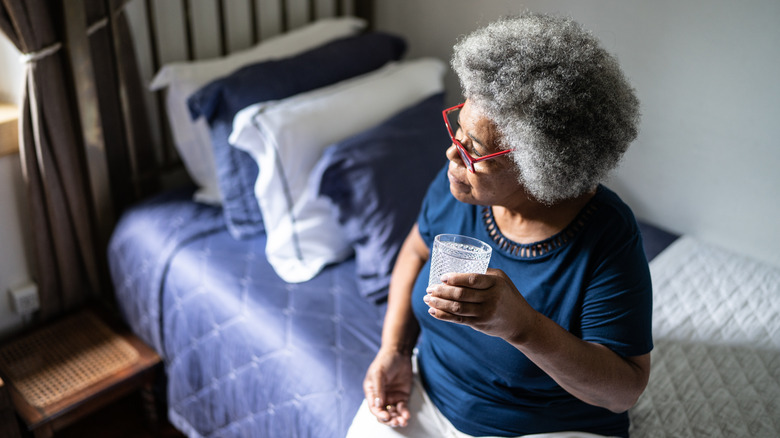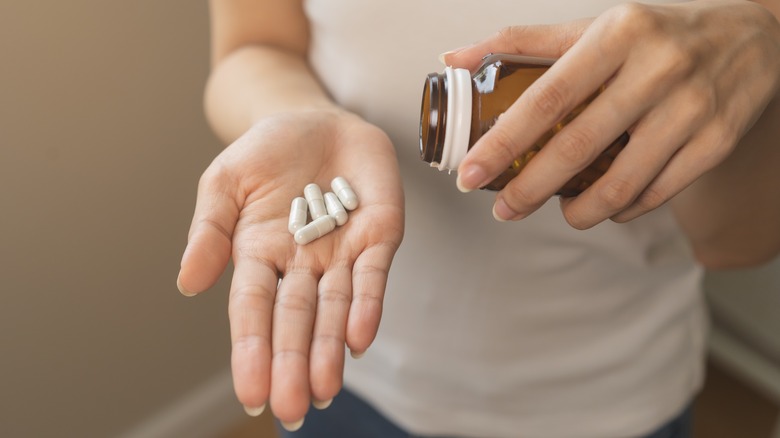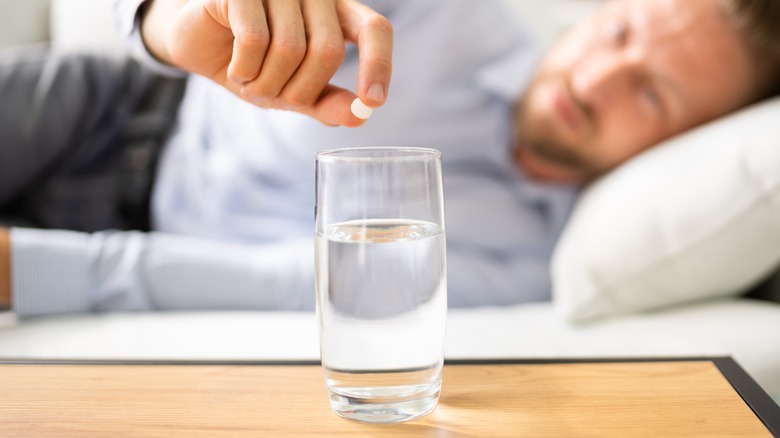The Hidden Dangers Of Lying Down Immediately After Taking Medication
Whether you take over-the-counter drugs or prescription medications, it's easy to think that once you've swallowed down that pill, your body will take care of the rest. However, if you choose to lie down immediately afterward, you may be making things harder on your body.
Some medications can aggravate, or even damage, the lining of the esophagus. This includes certain antibiotics, aspirin, NSAIDs, bisphosphonates, potassium or iron supplements, and quinidine, according to GoodRx Health. As a result, some individuals may experience related side effects, such as heartburn, indigestion, chest pain, or trouble swallowing. Heartburn symptoms, in particular, may be exacerbated if a person lies down after taking these medications. In more severe cases, one antibiotic known as clindamycin can potentially cause ulcers within the esophagus from prolonged exposure.
The reason is that when lying down, it takes longer for the drug to make its way through the esophagus and down to the stomach, explains Drugs.com. The more time the pill spends in the esophagus, the more chemical exposure our esophageal lining is subjected to.
It may take longer for medications to be absorbed
Most medications need a little time before they kick in. This is because the chemicals are processed through various organs before they are dispersed into the bloodstream (via Orlando Clinical Research Center). How long it takes for a drug to break down will vary based on age, weight, stress, exercise levels, or whether we're taking any additional medications, among other factors. Generally speaking, however, this process takes about 30 minutes for most medications, at which point we may start to feel the effects. That being said, how we position ourselves when taking these medications may influence absorption time.
In a 2022 research article published in Physics of Fluids, researchers noted that one's posture can affect a drug's dissolution rate by as much as 83%. Once it's swallowed and dispensed into the stomach, the closer a pill falls toward the lower region of the stomach, the sooner it is deposited into the small intestine where it proceeds to dissolve into the bloodstream (via HUB). Using laboratory stomach models, the researchers tested four different postures to see which one landed the pills closest to the bottom of the stomach. The postures tested included lying on the right side, lying on the left side, lying straight back, or standing upright. When study participants lay on their backs when taking medications, the pills landed further away from the bottom of the stomach, leading this position to have the third-longest absorption time out of the four postures.
How long you should wait before lying down
On the other hand, the research findings also showed that not all reclined positions seemed to slow drug absorption time. While the posture associated with the longest absorption time was lying on one's left side, positioning oneself on the right side when taking medications was found to have the fastest absorption time because it landed the pill closest to the bottom of the stomach (via HUB). In one example, the researchers noted that a drug could take over an hour and a half to dissolve when lying on one's left side but potentially only ten minutes when lying on one's right side.
Although slowed absorption time is one factor to consider, lying down after taking medication is particularly advised against when it comes to drugs that may irritate the esophagus, such as those previously mentioned. Rather, individuals should refrain from lying down for approximately ten to 30 minutes after taking the antibiotic clindamycin (via Drugs.com). For other antibiotics (such as tetracyclines), aspirin, NSAIDs, bisphosphonates, quinidine, and iron or potassium supplements, patients should wait even longer before lying down — specifically 30 minutes to one hour (per GoodRx Health). Finally, it is important to remember to always take medications with plenty of fluid.



